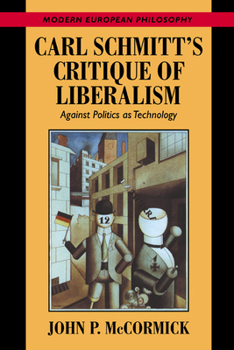Carl Schmitt's Critique of Liberalism: Against Politics as Technology
(Part of the Modern European Philosophy Series)
Select Format
Select Condition 
Book Overview
In this first in-depth critical appraisal in English of the writings of Carl Schmitt, John McCormick has furnished philosophers, historians, and political theorists with the most comprehensive account... This description may be from another edition of this product.
Format:Paperback
Language:English
ISBN:0521664578
ISBN13:9780521664578
Release Date:June 1999
Publisher:Cambridge University Press
Length:368 Pages
Weight:1.05 lbs.
Dimensions:0.8" x 6.1" x 9.2"
Customer Reviews
2 ratings
More slanted than enchanted, but scholarly
Published by Thriftbooks.com User , 18 years ago
Carl Schmitt must have written a tremendous number of brilliant things to be remembered so well for so long. In CARL SCHMITT'S CRITIQUE OF LIBERALISM / AGAINST POLITICS AS TECHNOLOGY, John P. McCormick reiterates a few themes which tie Schmitt to now-familiar conservative thoughts of ten years ago, when those who were seeking for ways that America could distinguish itself from all others as a superpower exhibiting technological powers excelling all other forms of thought could look to Schmitt for ideas that would transcend Max Weber's categories of modernity by employing emergency powers to establish absolutely new political conditions that would be more appealing than the flip-flops of liberalism. The collapse of the German fantasy with which Schmitt is most closely associated for supporting the use of emergency powers in Germany is the single most compelling argument frequently mentioned as an aside by McCormick to discredit Schmitt as a theorist of effective politics, but McCormick was writing far too long ago to make reference to the forms of confusion that dominate the news in 2005: Katrina was a natural disaster that made pre-storm evacuation look like the best policy, while voters in Iraq are preparing to vote on a constitution which has already missed a deadline for the Parliament to determine what Iraqis would agree to state in their constitution. This book is philosophical enough to associate Hegel, who was mentioned in the longest footnote in THE CONCEPT OF THE POLITICAL, with what the importance of any particular moment might be, and Chapter 1 of this book will satisfy those who would like the contrast of Schmitt as a student of Max Weber to a Marxist who was also devoted to "secular messianic Judaism" (p. 35) and was denounced by Schmitt as a Jew and a Marxist during the years of National Socialism in Germany. Among the things that I did not previously know about Carl Schmitt, note 12 on pages 35-36 reveals: Schmitt was certainly a believing Roman Catholic in the early twenties, writing frequently in the Catholic press but never officially joining the Catholic Center Party. He was excommunicated by the Church in 1926 because of the complexities of his marital situation. He apparently grew quite bitter toward the Church in the late Weimar Republic, publicly feuding with the more moderate Center party. His antipathy reached its peak under National Socialism, as he is quoted to have said in 1938: "If the Pope excommunicates a nation so therefore does he only excommunicate himself." ... Chapter 2, "Myth as Antidote to the "Age of Neutralizations": Nietzsche and Cultural Conflict as Response to Technology, manages to quote a page of section 373 of THE GAY SCIENCE by Nietzsche, but it omits Nietzsche's conclusion arising out of an understanding of music: But an essentially mechanical world would be an essentially meaningless world. Assuming that one estimated the value of a piece of music according to how much of it could be
Best of the Secondary Literature
Published by Thriftbooks.com User , 21 years ago
If one were planning to read just one secondary source on Carl Schmitt--this should be it. The book provides a broad and fair study of Schmitt's thought (both his legal and political theory), and is generally written in a lively fashion. Moreover, McCormick's thoughts on Hobbes, Weber, Nietzsche, and the Critical Theorists are also illuminating. Much of the other secondary literature on Schmitt is either too polemical (Scheuerman on the left, Gottfried on the right), too focused on his legal theory, or too caught up in bending Schmitt to their own purposes (see the journal "Telos"). This book originated from Prof. McCormick's PhD thesis, and sometimes reads like a first book (the organization and chapter segues are sometimes rough), but if this is his first effort it will be worthwhile to pay attention to his future efforts.





